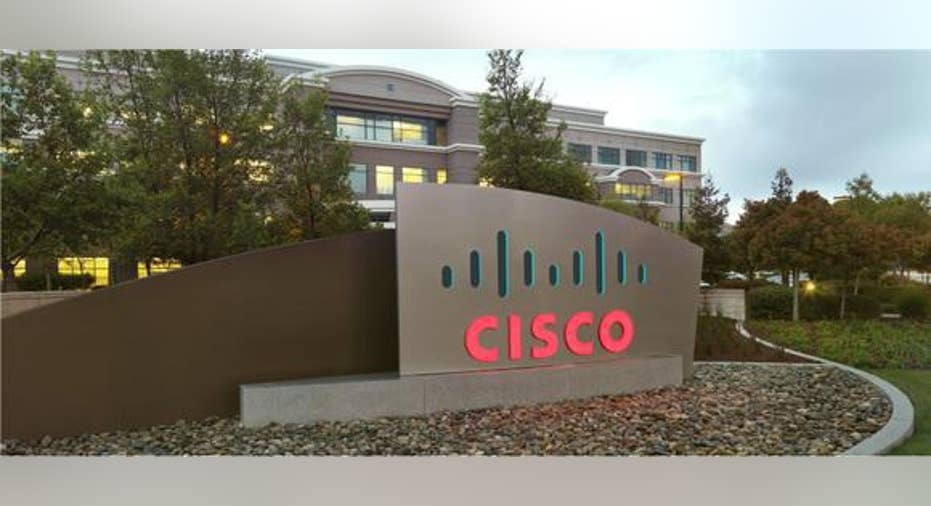Better Buy: Hewlett Packard Enterprise Co. or Cisco Systems Inc?

Hewlett-Packard Enterprise and Cisco Systems are both mature tech stocks associated with stable returns instead of explosive growth. The two companies generally aren't considered competitors, but HPE notably became a networking rival to Cisco last year by acquiring Aruba Networks. Will one of these slow-growth tech stocks outperform the other this year? Let's discuss their strengths, weaknesses, and valuations to gain insight.
HPE's strengths and weaknessesHewlett-Packard split into two companies last year, with HPE retaining the enterprise hardware and software units and HP keeping the PC and printer divisions. Since the two stocks started trading separately last October, HPE shares have gained 5%, while HP shares have dipped 2%.
Source: HPE.
HPE's revenue fell 3% annually to $12.7 billion last quarter, which narrowly beat expectations by $40 million. Enterprise Group (hardware and related services) revenue rose 1% to $7.1 billion. Within that total, server, storage, and tech services revenue all posted single-digit declines, but networking sales surged 54%, thanks to the Aruba acquisition and strong demand in China. However, enterprise services revenue fell 6% to $4.7 billion due to a loss of market share and the rise of cloud-based IT and business services. Software and financial services revenue also declined.
On the bottom line, HPE's non-GAAP net earnings fell 15% to $0.7 billion. However, non-GAAP EPS, inflated by buybacks, only fell 7% to $0.41 and beat estimates by a penny. Job cuts kept operating expenses roughly flat at $12.3 billion. During the conference call (as transcribed by Thomson Reuters), CEO Meg Whitman stated that HPE would launch a "market-changing" converged infrastructure platform with integrated server and storage technologies, which would be 20% cheaper than comparable solutions from Nutanix. HP also issued full-year guidance that matched analyst expectations for 2.2% earnings growth.
Cisco's strengths and weaknessesCisco shares have remained roughly flat since last October. According to research firm IDC, Cisco controlled 59.2% of the global Ethernet switching market in the fourth quarter of 2015. HPE and Huawei, the second- and third-largest players, respectively controlled 9.2% and 6.1%. One of Cisco's core strategies is to bundle its networking hardware and software solutions into cheaper enterprise packages than smaller players likeAruba.
Source: Cisco.
Cisco's revenue dipped 0.1% annually to$11.93 billion last quarter, which still topped estimates by $170 million. Excluding the set-top box business it sold to Technicolor, revenue rose 2%. Revenue at Cisco's data center and switching units, which together accounted for over a third of its sales, respectively fell 3% and 4%. However, service provider video sales surged 37% thanks to robust demand in China, security revenue rose 11% due to elevated cyberthreat concerns, collaboration sales improved 3%, and routing sales grew 5%. Cisco estimates that sales for the current quarter will rise 1% to 4% annually, beating expectations for a 1% decline.
On the bottom line, Cisco's non-GAAP net income rose 7% annually to $2.9 billion. Non-GAAP earnings per share, slightly boosted by buybacks, rose 8% to $0.57 per share and beat expectations by three cents. Cisco expects to post flat to 4% non-GAAP earnings growth for the current quarter, which matches analyst expectations. To strengthen its long-term pipeline, Cisco has acquired a wide variety of security, cloud, and connected device companies over the past few years.
Shareholder value and valuationsHPE and Cisco are both shareholder-friendly companies. Last quarter, HPE announced plans to return at least 100% of its estimated free cash flow of $2 to $2.2 billion this year to its shareholders through buybacks and dividends. HPE also expects to gain about $2 billion by selling its 51% stake in its Chinese H3C Technologies unit, which will mostly be spent on buybacks once the deal closes. During the first quarter, HPE spent $1.2 billion on buybacks and nearly $100 million on dividends, and currently pays a forward annual yield of 1.3%.
Over the past 12 months, Cisco spent 23% of its FCF on buybacks and 34% on dividends. While that might make Cisco look less "generous" than HPE, Cisco pays a higher forward yield of 3.7% and has more cash to spend on acquisitions and dividend hikes.
Analysts expect HPE to grow its annual earnings by 2.5% over the next five years, which gives it a 5-year PEG ratio of 3.7. Cisco's earnings are expected to rise 8.2% during that period, which gives it a much lower PEG ratio of 1.5. Neither ratio has fallen beneath the "undervalued" threshold of 1, but Cisco looks cheaper compared to its earnings growth potential.
The winner: CiscoI'm not a fan of HPE's strategy of relying heavily on buybacks and job cuts to inflate earnings. Newer server tech and its acquisition of Aruba might offset sales declines in other businesses, but its dividend remains too low and its PEG ratio too high compared to Cisco's. So all things considered, Cisco is the better overall pick for stable growth and steady income.
The article Better Buy: Hewlett Packard Enterprise Co. or Cisco Systems Inc? originally appeared on Fool.com.
Leo Sun has no position in any stocks mentioned. The Motley Fool recommends Cisco Systems. Try any of our Foolish newsletter services free for 30 days. We Fools may not all hold the same opinions, but we all believe that considering a diverse range of insights makes us better investors. The Motley Fool has a disclosure policy.
Copyright 1995 - 2016 The Motley Fool, LLC. All rights reserved. The Motley Fool has a disclosure policy.



















